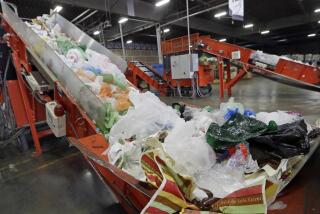FOUNTAIN VALLEY
- Share via
Scavenging Common Despite Ban by City
Poking a stick inside a trash can on the curb of a residential street, 75-year-old Thu rummaged through garbage in hopes of finding recyclables.
Wearing a pair of plastic yellow gloves, Thu, who came here four months ago from Vietnam, walks neighborhoods in the northwest section of the city during early morning hours each Tuesday--trash collection day--to look for aluminum cans.
Thu, who gave only his first name and carried a plastic sack filled with aluminum cans, said his 68-year-old wife walks another neighborhood. They sell the cans to make a few bucks--together they earn about $35 a month--to help buy food.
The couple are not the only ones who roam the streets in search of recyclables.
Other men and women have regular neighborhood routes and dig deep inside trash cans to retrieve sacks of newspapers and telephone books that residents leave out on the curb.
The scavengers load the goods into their cars, along with aluminum chairs, cans, bottles, old bicycles, tires, screen doors and other items they collect for resale.
Yet in this city, it is illegal for people to go through residents’ garbage cans.
“You do feel sorry for the people who are doing this as a means to make a living,” said City Councilwoman Laurann Cook, who walks in the mornings and often confronts these people to let them know about the city’s ordinance prohibiting scavenging.
“We owe it to the citizens of Fountain Valley to have an ordinance that protects them,” she said.
On a recent morning, an older man cruised the streets, a small trailer hitched to his car. “I just do it for the heck of it,” said the man, whose trailer was loaded with some plastic soda bottles, aluminum pieces and a pair of old skis.
Another man, who spoke only Spanish, said he lost his job and rifles through curbside garbage cans about four or five days a week here and in Huntington Beach. He makes about $80 a week and needs the money for food and rent.
The city takes a dim view of the activity. Once residents’ trash cans hit the curb, what’s inside becomes city property, said Mayor John Collins.
And he said the ordinance is important because of health, safety and crime concerns. “People use (recycling as an excuse) to case neighborhoods,” he said.
In addition, the recyclers often scatter garbage on streets, and besides, a person’s trash may contain items such as credit card and banking information.
Residents interviewed at random had a variety of views on the ordinance and the scavengers.
“I don’t especially like them going through my trash--it’s kind of personal,” agreed 30-year resident Myrna Arledge, who added that she will put newspapers aside for scavengers. “At least it would have a chance of being recirculated.”
Resident Pat Evans also said she doesn’t like it. “It’s an unsafe feeling,” Evans said, adding she doesn’t place cans on the curb on trash day until late morning to discourage people.
Others, such as Alfonso Ahuero, don’t mind. Ahuero puts recyclables on top of trash cans so people can easily take them.
“I thought they were providing a service by recycling,” he said. “There are a lot of people out of work, and they need it.”
City officials say there have been few complaints and suppose that is because most residents are compassionate and they also don’t know that the city prohibits scavengers from going through their trash cans.
“We know people go on circuits” of neighborhoods, said Police Chief Elvin Miali. “But we try to encourage people to give (police) a call” if they find someone hunting through their garbage cans.
More to Read
Sign up for Essential California
The most important California stories and recommendations in your inbox every morning.
You may occasionally receive promotional content from the Los Angeles Times.













